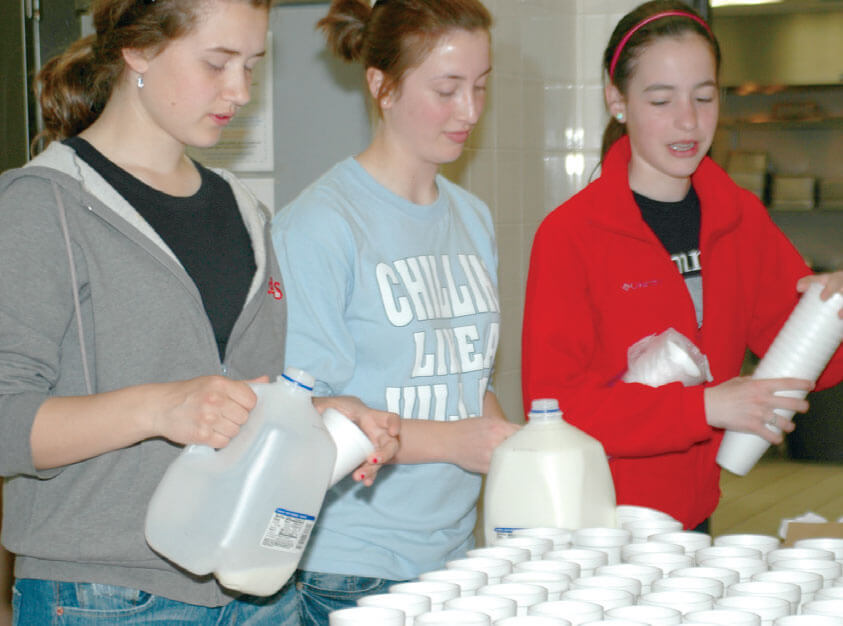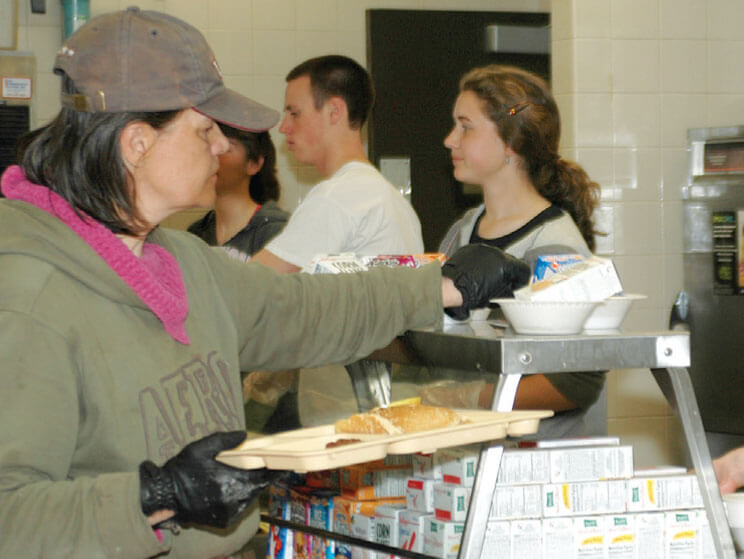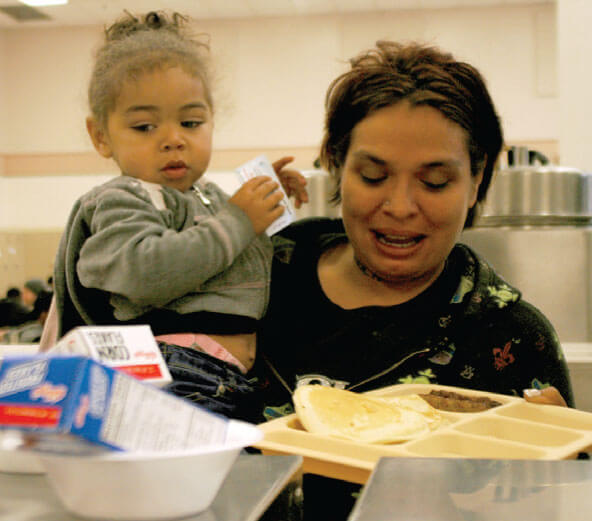by Nancy Manning

My brother kept hounding me to join him, but I wouldn’t go. Then on Christmas morning, when I started to complain about the ancient Greece project I had to do for my World Civ class, he dragged me along.
He volunteered at a soup kitchen called The House of Bread, but I hadn’t a clue about what he did. In the car, he said they made breakfast to feed the hungry. Everyone was admitted, no questions asked. It sounded like no big deal.
But driving through this Hartford neighborhood frightened me. Broken windows and graffiti blighted the rows of brick buildings. Litter lined the street and traffic signs were knocked over. As I walked the narrow sidewalk, a bitter smell of urine pierced my nostrils, so I scurried to the door. Was it this important to give to others?
Inside the hall round tables cluttered the room. A small adjacent kitchen had two warped frying pans, one spatula, and a pile of mismatched plates chipped at the edges. A man stood by the stove with a bowl of pancake batter. A woman lined up paper plates and utensils on a table. My brother and I were assigned to serve people.
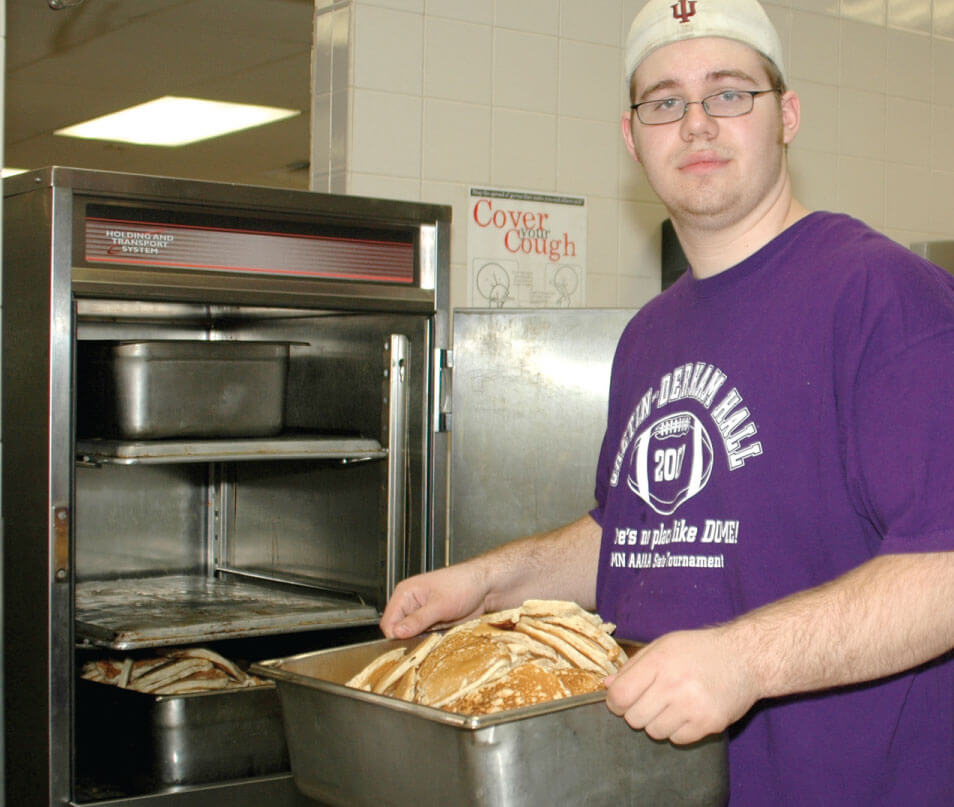
Even before we were ready, I could hear voices of people who lined the sidewalk. Not until the door was opened did I see what a motley collection of people they were. Some of the men had missing teeth, most of the women had ripped clothing, and one man was so filthy I was sure he hadn’t showered in days or months. I held my breath each time I passed him, but I also feared for my life. Was he a criminal? A drug addict? Did he conceal a weapon that he would brandish to take us hostage? As I wove in and out of tables to deliver pancakes, I kept turning around to check my back.
What had I gotten myself into?
People asked whether I was one of the nuns who ran the place — more importantly if I could pass out extra maple syrup. I answered with quick responses, then turned to my brother and whispered, “They can’t be all homeless.”
He reminded me, “No questions asked.”
I wasn’t satisfied.
But when a young mother walked in without a winter coat, a baby in her arms and two toddlers clinging to her, compassion overwhelmed me. She couldn’t have been more than 15, my own age. Three men immediately gave up their places. The girl seated her toddlers. She opened up the blankets wrapped around her children, and I saw they were still dressed in their pajamas. Watching them, I felt a mixture of sadness and anger. Children shouldn’t be here on Christmas or any other day. They should be home snuggling in their beds or playing cheerfully with the new Iron Man Action Figure or the Dora the Explorer backpack Santa had left them.
As a child, I believed life was unfair. The sky was blue and not purple, my favorite color. Halloween came only once a year. My brother always won the wishbone at Thanksgiving. Every Christmas my family celebrated the birthday of Baba, my Ukrainian grandmother. Why couldn’t I get double the presents?
When I was eight, my father injured his back on the job and was out of work, so money was tight. At Christmas we received only one gift each. Mine was a chalkboard. Why would I want that? I hated school, longed for June and freedom from the bondage of teachers and the imprisonment of homework.
Visiting my cousin that year, I counted too many board games for one person. A mountain of new clothes, hair bands, tights and patent leather shoes choked the bottom of the spruce tree that emanated a sweet pine scent. Life really wasn’t fair. Why wasn’t I born into my cousin’s family?
Returning to school that year provided more torture. All the other third-graders showed off their new outfits. On either side of me, a boy boasted a new sweater and corduroy pants. In front of me, a girl wore a colorful jumper and the gold charm bracelet I kept wishing for. I had to suffer with the drab blue dress I had worn on the opening day back in September. Worse than that, when two boys pointed at my worn shoes and giggled, I curled my feet under my chair to hide the rusty buckles and the wrinkles from wear.
But here in this crummy little soup kitchen, I was seeing real hardship firsthand.
I tried to bubble with conversation, “Good morning and welcome.”
The mother pressed the bundled baby to her chest.
I knelt down by the boy and the girl and wished them each a Merry Christmas. I thought about asking what gifts they opened this morning from Santa, but then remembered the years he barely made it to my house.
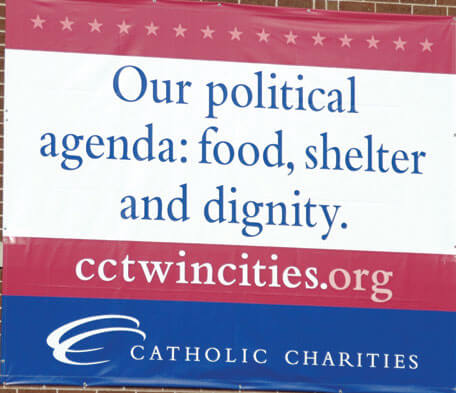
Questions began to simmer in my brain. Where could I obtain some winter coats quickly? Were there toys anywhere in the kitchen? How could I get those children to smile? If I had my old chalkboard, we could play Ticktacktoe or Hangman.
My brother arrived with plates of pancakes and I helped serve the children.
The youngsters gobbled the small cubes I cut up. Maple syrup dribbled down their chins. Their feet didn’t reach the floor; they kicked their legs happily back and forth as they ate.
After the mother had finished the last crumb of pancake and wiped the children’s faces, she wrapped the makeshift jackets around each toddler.
I swallowed hard. “Anything else I can get you?”
“We’re fine,” the mother answered, head lowered. “Rashon and Teesha, say thank you to the lady.”
Rashon waved. Teehsa looked at me and crinkled her nose. “No lady. An angel.”
Blushing, I grinned. Teesha beamed back an enormous smile.
Later, as our crew washed the vacant tables, put away the supplies, and cleaned the grill, joy danced in my heart. I knew I’d return.
Each Christmas I passed out more plates of pancakes, but I never saw the woman or her three children again. I never again asked, “Why me?” If I looked around, there was always someone worse off. The true meaning of Christmas became equally obvious: not to receive but to give of yourself. No questions asked.
Las Posadas, a Hispanic Tradition
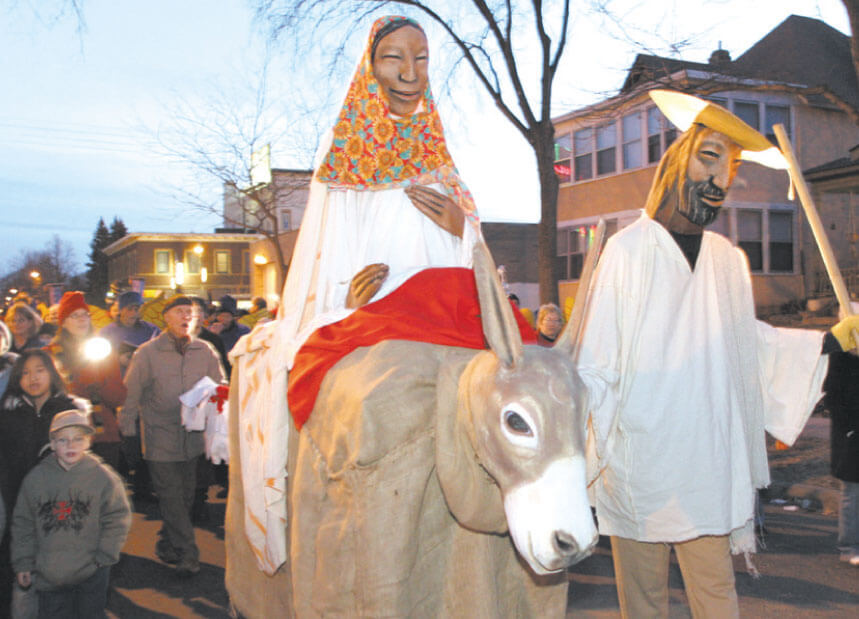
Beginning December 16 of each year, many Spanish-speaking communities celebrate Las Posadas. For nine consecutive evenings, a community re-enacts Mary and Joseph’s search for lodging. Accompanied by members of the congregation, a man and a woman representing Joseph and Mary knock on the doors of homes and churches, asking at each for shelter. Joseph sings,
En el nombre del cielo,
os pido posada
Pues no puede andar
mi esposa amada.
In the name of Heaven,
I beg you for lodging,
For she cannot walk
my beloved wife.
The hardhearted innkeeper responds,
This is not an inn, so keep on going,
I cannot open - you may be a thief.
The next verse begins:
Don’t be inhuman – have mercy on us.
The God of the heavens will reward you.
At each stop the group begs for shelter, and each time the door is closed to the Holy Family. Only on Christmas Eve do they find welcome, and the celebration of Christmas begins.
For some, this tradition is not just a re-enactment of an ancient story. For too many, the closed doors and harsh words are a painful present reality.
Even those who come to the United States with all the required documents can feel the sting of rejection. Differences in clothing, culture, language, and appearance can make people afraid.
The American Catholic church is now one third Hispanic and growing. Like earlier immigrants who arrived in great numbers during the 19th century, Hispanic Catholics bring a wealth of customs and a deep faith to enrich our 21st century experience. Santa Claus, complete with his sleigh of reindeer, comes from northern European immigrants. The popular carol “Silent Night” originates in Germany, Martin Luther the author.
Customs like Las Posadas, or celebrating the feast of Our Lady of Guadalupe on December 12, are reminders for us to cut through today’s commercialism and remember the true meaning of Christmas.

